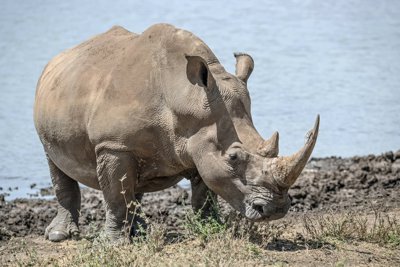Between 2008 and 2018 at least 9,151 white rhinoceros and black rhinoceros were illegally killed across Africa for their horn, which is valued highly on transcontinental black markets. Currently ~5% of the total population of these species is being lost annually due to poaching, driving them towards extinction. Most rhino poaching occurs at night and it can be impossible to detect poachers using conventional torch spotlighting.
Approach
Researchers at the University of Gloucestershire identified low-cost thermal infrared (TI) as a potential tool for anti-poaching operations and worked with front-line rangers in South Africa in 2015 to conduct the first robust empirical tests of low-cost TI for detecting humans in the African bush.
Research showed that low-cost TI was highly effective in detecting potential poachers, increasing detection distance by >50% compared to spotlighting. Use of TI equipment on nocturnal anti-poaching patrols indicated that TI could also be used to detect animals that were otherwise very difficult to locate, and therefore an important contribution to ecological surveying as well.
Impact
The research benefited the wildlife reserve in South Africa where the original research was conducted. The reserve had previously been hit by poachers in 2014, when it had lost one third of its rhino population. Researchers worked with the reserve to implement TI and since the reserve has seen a complete cessation of rhino poaching and the rhino population has grown by 50%.
TI-based anti-poaching offers an affordable approach as reserves frequently spend up to 60% of their total conservation budget each year on rhino anti-poaching initiatives.
The use of TI has also decreased bushmeat poaching, enhanced ranger wellbeing and morale, and enhanced ecological surveying.
The combined impacts of the research won the 'Research with Impact' award in the Green Gown Sustainability awards 2019.
More information
Institution: University of Gloucestershire
Researchers: Professor Anne Goodenough, Professor Adam Hart
Share this resource
This is an open access article under the terms of the Creative Commons Attribution License (CC BY NC 4.0), which permits use, adaptation, distribution and reproduction in any medium or format, provided the original work is cited and it is for non-commercial purposes. Please contact us for other uses.
How to cite
Royal Geographical Society (with IBG) (2023) Stopping the poachers: technological solutions for rhino conservation. Available at: https://rgs.org/stoppingpoachers Last accessed on: <date>
Featured image: David Clode / Unsplash
